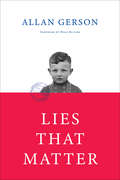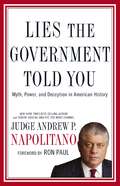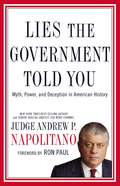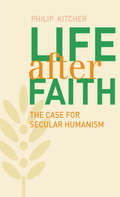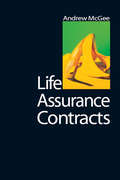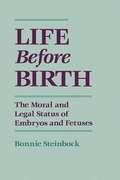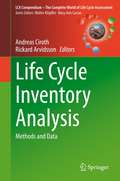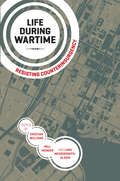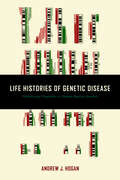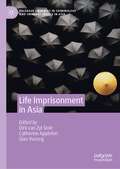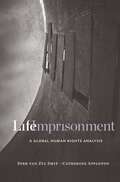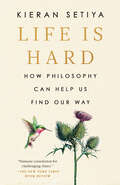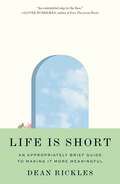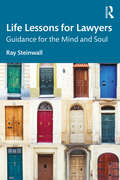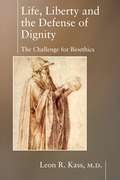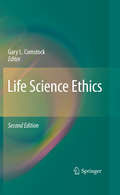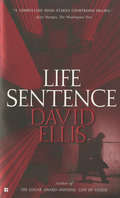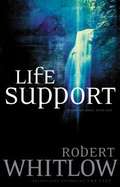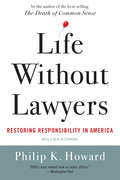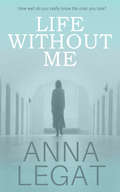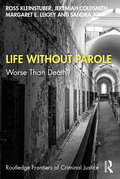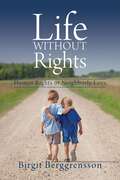- Table View
- List View
Lies That Matter: A federal prosecutor and child of Holocaust survivors, tasked with stripping US citizenship from aged Nazi collaborators, finds himself caught in the middle
by Allan GersonThe true story of a DOJ prosecutor’s complicated quest to deport Nazis: “The lessons that Mr. Gerson learns, and shares, could not be more timely.” —Seth Waxman, former US Solicitor GeneralAs the son of Holocaust survivors, federal prosecutor Allan Gerson thought his professional assignment to investigate and deport those who persecuted his family and others like them would make his parents proud. But their reaction was not what he expected. This is his memoir of the experience—and the complex emotions and questions it provoked.“It takes a young attorney whose Holocaust survivor parents and uncle had to lie in order to gain admittance into the U.S. to recognize the double-edged dangers of pursuing aging Nazi functionaries with the blunt instruments of American immigration law. Can the same laws be turned against his parents and other Jews like them? Allan Gerson tells the gripping story of his two years at the Department of Justice office charged with investigating and deporting aging Nazis living quietly in our midst. His interrogation of suspected perpetrators forces him to uncover secrets of his family and other anguished victims that he never wanted to know . . . This narrative reads like a bildungsroman, a coming of age story of a lawyer who went on to seek American legal remedies for historic crimes and injustices committed elsewhere.” —Samuel Norich, President, The Forward
Lies the Government Told You: Myth, Power, and Deception in American History
by Andrew NapolitanoYOU'VE BEEN LIED TO BY THE GOVERNMENTWe shrug off this fact as an unfortunate reality. America is the land of the free, after all. Does it really matter whether our politicians bend the truth here and there?When the truth is traded for lies, our freedoms are diminished and don't return.In Lies the Government Told You, Judge Andrew P. Napolitano reveals how America's freedom, as guaranteed by the U.S. Constitution, has been forfeited by a government more protective of its own power than its obligations to preserve our individual liberties."Judge Napolitano's tremendous knowledge of American law, history, and politics, as well as his passion for freedom, shines through in Lies the Government Told You, as he details how throughout American history, politicians and government officials have betrayed the ideals of personal liberty and limited government."--Congressman Ron Paul, M.D. (R-TX), from the Foreword
Lies the Government Told You: Myth, Power, and Deception in American History
by Andrew P. NapolitanoCenturies of government deception have suspended our freedom and replaced it with a mythology rich in the ideals we are promised but do not actually experience. The government's lies have become our country's heritage, passed down generationally and accepted over time as status quo. We allow our leaders to regulate, under false pretenses, every area of our supposedly free lives: What we eat, how our money is spent, how we protect ourselves. The basic tenets of living in a free society--the primacy of the individual and limited government-- are violated routinely and with little objection from those most affected. Judge Napolitano traces the deterioration of American freedom year by year, event by event, from the birth of the U.S. government to the economic and military crises of today. He illustrates how this distorted interpretation of government translates to loss for Americans--loss of life, loss of property, loss of freedom. The cost is staggering. Amid the bleak revelation is a call to action. Judge Napolitano offers a blueprint to salvage our freedom and restore the government to its intended role as an instrument to protect the freedoms of the people.
Life After Faith
by Mr Philip KitcherAlthough there is no shortage of recent books arguing against religion, few offer a positive alternative#151;how anyone might live a fulfilling life without the support of religious beliefs. This enlightening book fills the gap. Philip Kitcher constructs an original and persuasive secular perspective, one that answers human needs, recognizes the objectivity of values, and provides for the universal desire for meaningfulness. Kitcher thoughtfully and sensitively considers how secularism can respond to the worries and challenges that all people confront, including the issue of mortality. He investigates how secular lives compare with those of people who adopt religious doctrines as literal truth, as well as those who embrace less literalistic versions of religion. Whereas religious belief has been important in past times, Kitcher concludes that evolution away from religion is now essential. He envisions the successors to religious life, when the senses of identity and community traditionally fostered by religion will instead draw on a broader range of cultural items#151;those provided by poets, filmmakers, musicians, artists, scientists, and others. With clarity and deep insight, Kitcher reveals the power of secular humanism to encourage fulfilling human lives built on ethical truth.
Life Assurance Contracts
by Andrew McGeeLife assurance continues to be a topic of great practical significance, given the popularity of endowment mortgages and pensions, which contain an element of insurance, as well as the need for families to protect against the loss of their breadwinners. Since the first edition of this book in 1995 much has changed, with a fundamentally new regulatory structure under the Financial Services and Markets Act 2000, changes in divorce and bankruptcy law, as well as continued developments in areas such as insurable interest and utmost good faith. All these developments are covered in this new edition, which at the same time retains the extensive coverage of the well-established principles of this area of law. Areas dealt with include insurable interest, disclosure, cancellation, intermediaries, marketing, assignment, surrender and pension policies. This new edition has been comprehensively revised and updated to take account of changes since the last edition was published.
Life Before Birth: The Moral and Legal Status of Embryos and Fetuses (2nd Edition)
by Bonnie SteinbockThis book provides a framework for thinking clearly and coherently about the unborn. The book's thesis, the "interest view," states that all and only beings who have interests have moral standing, and only beings who possess conscious awareness have interests. The chapters apply the interest view, and explore the moral and legal aspects of a wide range of issues.
Life Cycle Inventory Analysis: Methods and Data (LCA Compendium – The Complete World of Life Cycle Assessment)
by Andreas Ciroth Rickard ArvidssonLife Cycle Inventory (LCI) Analysis is the second phase in the Life Cycle Assessment (LCA) framework. Since the first attempts to formalize life cycle assessment in the early 1970, life cycle inventory analysis has been a central part. Chapter 1 “Introduction to Life Cycle Inventory Analysis“ discusses the history of inventory analysis from the 1970s through SETAC and the ISO standard. In Chapter 2 “Principles of Life Cycle Inventory Modeling”, the general principles of setting up an LCI model and LCI analysis are described by introducing the core LCI model and extensions that allow addressing reality better. Chapter 3 “Development of Unit Process Datasets” shows that developing unit processes of high quality and transparency is not a trivial task, but is crucial for high-quality LCA studies. Chapter 4 “Multi-functionality in Life Cycle Inventory Analysis: Approaches and Solutions” describes how multi-functional processes can be identified. In Chapter 5 “Data Quality in Life Cycle Inventories”, the quality of data gathered and used in LCI analysis is discussed. State-of-the-art indicators to assess data quality in LCA are described and the fitness for purpose concept is introduced. Chapter 6 “Life Cycle Inventory Data and Databases“ follows up on the topic of LCI data and provides a state-of-the-art description of LCI databases. It describes differences between foreground and background data, recommendations for starting a database, data exchange and quality assurance concepts for databases, as well as the scientific basis of LCI databases. Chapter 7 “Algorithms of Life Cycle Inventory Analysis“ provides the mathematical models underpinning the LCI. Since Heijungs and Suh (2002), this is the first time that this aspect of LCA has been fundamentally presented. In Chapter 8 “Inventory Indicators in Life Cycle Assessment”, the use of LCI data to create aggregated environmental and resource indicators is described. Such indicators include the cumulative energy demand and various water use indicators. Chapter 9 “The Link Between Life Cycle Inventory Analysis and Life Cycle Impact Assessment” uses four examples to discuss the link between LCI analysis and LCIA. A clear and relevant link between these phases is crucial.
Life During Wartime
by Kristian Williams William Munger Lara Messersmith-Glavin"Together, the writers sound a sobering warning: the American government is an iron fist in a velvet glove whose purpose remains preserving the status quo and enriching the rich."- Publishers WeeklyWhat happens when the techniques of counterinsurgency, developed to squash small skirmishes and guerrilla wars on the border of Empire, blend into the state's apparatus for domestic policing? In Life During Wartime, fifteen authors and activists reflect on the American domestic security apparatus, detailing the increasing militarization of the police force and the re-emergence of infiltration and counter-intelligence as surveillance strategies, highlighting the ways that the techniques and the technologies of counterinsurgency have been applied on the home front, and offering strategies for resistance.Includes contributions Kristian Williams, Will Munger, Walidah Imarisha, George Ciccariello-Maher, Beriah Empie, Elaine Brown, Geoffrey Boyce, Conor Cash, Vicente L. Rafael, Alexander Reid Ross, Evan Tucker, Layne Mullett, Sarah Small, and Luce Guillen-Givins.
Life During Wartime
by Kristian Williams William Munger Lara Messersmith-Glavin"Together, the writers sound a sobering warning: the American government is an iron fist in a velvet glove whose purpose remains preserving the status quo and enriching the rich."- Publishers WeeklyWhat happens when the techniques of counterinsurgency, developed to squash small skirmishes and guerrilla wars on the border of Empire, blend into the state's apparatus for domestic policing? In Life During Wartime, fifteen authors and activists reflect on the American domestic security apparatus, detailing the increasing militarization of the police force and the re-emergence of infiltration and counter-intelligence as surveillance strategies, highlighting the ways that the techniques and the technologies of counterinsurgency have been applied on the home front, and offering strategies for resistance.Includes contributions Kristian Williams, Will Munger, Walidah Imarisha, George Ciccariello-Maher, Beriah Empie, Elaine Brown, Geoffrey Boyce, Conor Cash, Vicente L. Rafael, Alexander Reid Ross, Evan Tucker, Layne Mullett, Sarah Small, and Luce Guillen-Givins.
Life Histories of Genetic Disease: Patterns and Prevention in Postwar Medical Genetics
by Andrew J. HoganA history of genetic testing warns that such tests may tell us more than we want to know.Medical geneticists began mapping the chromosomal infrastructure piece by piece in the 1970s by focusing on what was known about individual genetic disorders. Five decades later, their infrastructure had become an edifice for prevention, allowing today’s expecting parents to choose to test prenatally for hundreds of disease-specific mutations using powerful genetic testing platforms. In Life Histories of Genetic Disease, Andrew J. Hogan explores how various diseases were "made genetic" after 1960, with the long-term aim of treating and curing them using gene therapy. In the process, he explains, these disorders were located in the human genome and became targets for prenatal prevention, while the ongoing promise of gene therapy remained on the distant horizon.In narrating the history of research that contributed to diagnostic genetic medicine, Hogan describes the expanding scope of prenatal diagnosis and prevention. He draws on case studies of Prader-Willi, fragile X, DiGeorge, and velo-cardio-facial syndromes to illustrate that almost all testing in medical genetics is inseparable from the larger—and increasingly "big data"–oriented—aims of biomedical research. Hogan also reveals how contemporary genetic testing infrastructure reflects an intense collaboration among cytogeneticists, molecular biologists, and doctors specializing in human malformation.Hogan critiques the modern ideology of genetic prevention, which suggests that all pregnancies are at risk for genetic disease and should be subject to extensive genomic screening. He examines the dilemmas and ethics of the use of prenatal diagnostic information in an era when medical geneticists and biotechnology companies have begun offering whole genome prenatal screening—essentially searching for any disease-causing mutation. Hogan’s focus and analysis is animated by ongoing scientific and scholarly debates about the extent to which the preventive focus in contemporary medical genetics resembles the aims of earlier eugenicists. Written for historians, sociologists, and anthropologists of science and medicine, as well as bioethics scholars, physicians, geneticists, and families affected by genetic conditions, Life Histories of Genetic Disease is a profound exploration of the scientific culture surrounding malformation and mutation.
Life Histories of Genetic Disease: Patterns and Prevention in Postwar Medical Genetics
by Andrew J. HoganA richly detailed history that “uncovers the challenges and limitations of our increasing reliance on genetic data in medical decision making” (Shobita Parthasarathy, author of Building Genetic Medicine).Medical geneticists began mapping the chromosomal infrastructure piece by piece in the 1970s by focusing on what was known about individual genetic disorders. Five decades later, their infrastructure had become an edifice for prevention, allowing expectant parents to test prenatally for hundreds of disease-specific mutations using powerful genetic testing platforms. In this book, Andrew J. Hogan explores how various diseases were “made genetic” after 1960, with the long-term aim of treating and curing them using gene therapy. In the process, he explains, these disorders were located in the human genome and became targets for prenatal prevention, while the ongoing promise of gene therapy remained on the distant horizon.In narrating the history of research that contributed to diagnostic genetic medicine, Hogan describes the expanding scope of prenatal diagnosis and prevention. He draws on case studies of Prader-Willi, fragile X, DiGeorge, and velo-cardio-facial syndromes to illustrate that almost all testing in medical genetics is inseparable from the larger—and increasingly “big data”–oriented—aims of biomedical research. Hogan also reveals how contemporary genetic testing infrastructure reflects an intense collaboration among cytogeneticists, molecular biologists, and doctors specializing in human malformation.Hogan critiques the modern ideology of genetic prevention, which suggests all pregnancies are at risk for genetic disease and should be subject to extensive genomic screening. He examines the dilemmas and ethics of the use of prenatal diagnostic information in an era when medical geneticists and biotechnology companies offer whole genome prenatal screening—essentially searching for any disease-causing mutation. Hogan’s analysis is animated by ongoing scientific and scholarly debates about the extent to which the preventive focus in contemporary medical genetics resembles the aims of earlier eugenicists. Written for historians, sociologists, and anthropologists of science and medicine, as well as bioethics scholars, physicians, geneticists, and families affected by genetic conditions, Life Histories of Genetic Disease is a profound exploration of the scientific culture surrounding malformation and mutation.
Life Imprisonment in Asia (Palgrave Advances in Criminology and Criminal Justice in Asia)
by Catherine Appleton Dirk van Zyl Smit Giao VucongLife imprisonment is the punishment most often imposed worldwide for what societies regard as the most serious offences. Yet, in Asia the phenomenon has never been studied systematically. Life Imprisonment in Asia fills this major gap. It brings together thirteen new essays on life imprisonment in key jurisdictions in the region. Each chapter consolidates what is known about the law and practice of life imprisonment in the jurisdiction and then explores aspects of the imposition or implementation of life sentences that the authors regard as particularly problematic. In some instances, the main issue is the imposition of life sentences by the courts and their relationship to the death penalty. In others, the focus is on the treatment of life sentenced prisoners. In many instances, the most prominent question is whether life sentenced prisoners should be released and, if so, according to what processes. In the overview chapter, the editors place the complex picture that emerges of life imprisonment in Asia in a global context and point to reforms urgently required to ensure that Asian life sentences meet international human rights standards.Life Imprisonment in Asia should be read by everyone who has an interest in just punishments for serious offences, not only in Asia, but throughout the world. It will be an invaluable tool for lawyers, criminologists, policy makers and penal reform advocates in the region and beyond.
Life Imprisonment: A Global Human Rights Analysis (Oñati International Series In Law And Society Ser.)
by Dirk van Zyl SmitLife imprisonment has replaced the death penalty as the most common sentence imposed for heinous crimes worldwide. Consequently, it has become the leading issue of international criminal justice reform. In the first survey of its kind, Dirk van Zyl Smit and Catherine Appleton argue for a human rights–based reappraisal of this harsh punishment.
Life Is Hard: How Philosophy Can Help Us Find Our Way
by Kieran SetiyaA philosophical guide to facing life&’s inevitable hardships. There is no cure for the human condition: life is hard. But Kieran Setiya believes philosophy can help. He offers us a map for navigating rough terrain, from personal trauma to the injustice and absurdity of the world. In this profound and personal book, Setiya shows how the tools of philosophy can help us find our way. Drawing on ancient and modern philosophy as well as fiction, history, memoir, film, comedy, social science, and stories from Setiya&’s own experience, Life Is Hard is a book for this moment—a work of solace and compassion.Warm, accessible, and good-humored, this book is about making the best of a bad lot. It offers guidance for coping with pain and making new friends, for grieving the lost and failing with grace, for confronting injustice and searching for meaning in life. Countering pop psychologists and online influencers who admonish us to &“find our bliss&” and &“live our best lives,&” Setiya acknowledges that the best is often out of reach. Instead, he asks how we can weather life&’s adversities, finding hope and living well when life is hard.
Life Is Short: An Appropriately Brief Guide to Making It More Meaningful
by Dean RicklesWhy life’s shortness—more than anything else—is what makes it meaningfulDeath might seem to render pointless all our attempts to create a meaningful life. Doesn’t meaning require transcending death through an afterlife or in some other way? On the contrary, Dean Rickles argues, life without death would be like playing tennis without a net. Only constraints—and death is the ultimate constraint—make our actions meaningful. In Life Is Short, Rickles explains why the finiteness and shortness of life is the essence of its meaning—and how this insight is the key to making the most of the time we do have.Life Is Short explores how death limits our options and forces us to make choices that forge a life and give the world meaning. But people often live in a state of indecision, in a misguided attempt to keep their options open. This provisional way of living—always looking elsewhere, to the future, to other people, to other ways of being, and never committing to what one has or, alternatively, putting in the time and energy to achieve what one wants—is a big mistake, and Life Is Short tells readers how to avoid this trap.By reminding us how extraordinary it is that we have any time to live at all, Life Is Short challenges us to rethink what gives life meaning and how to make the most of it.
Life Lessons for Lawyers: Guidance for the Mind and Soul
by Ray SteinwallThis book draws on the author’s professional experience and published works in the areas of leadership, philosophy, psychology and management (amongst others) to discuss the ‘softer’ qualities of being a good lawyer – qualities which are not taught or widely documented, such as humility, confidence, personal relationships and our dreams and vision.The book demonstrates that we can be individuals within the law and outlines qualities that can both enrich our work and our souls. A theme throughout many of the chapters is to encourage us to think and act differently to what we may have been taught, what others expect or what we ourselves believe. To know that regardless of our strengths and weaknesses, we are unique individuals in the law. This book offers wisdom and pragmatic support for lawyers and anyone involved with the law.Covering a range of issues, it includes advice on: • Maintaining one’s passions inside and outside law • Dealing with perfectionist tendencies, anxiety and depression • Manging our fears and dealing with mistakes • Striving for an honourable path • Understanding and leveraging the organisational matrix • Acting as a moral voice in your organisation • Leading with humility and vulnerability • Taking breaks and reconnecting with ourselves • Navigating structural inequalities in one’s career.This book is an easy must-read for anyone seeking advice on how to succeed in law.
Life Liberty & the Defense of Dignity
by Leon KassAt the onset of Life, Liberty and the Defense of Dignity, Leon Kass gives us a status report on where we stand today: "Human nature itself lies on the operating table, ready for alteration, for eugenic and psychic 'enhancement,' for wholesale redesign. In leading laboratories, academic and industrial, new creators are confidently amassing their powers and quietly honing their skills. For anyone who cares about preserving our humanity, the time has come for paying attention." Trained as a medical doctor and biochemist, Dr. Kass has become one of our most provocative thinkers on bioethical issues. In Life, Liberty and the Defense of Dignity, he has written a book that grapples with the moral meaning of the new biomedical technologies now threatening to take us back to the future envisioned by Aldous Huxley in Brave New World. In a series of mediations on cloning, embryo research, the sale of organs, and the assault on mortality itself, Kass questions the wisdom of trying to break down the natural boundaries given us and to remake the human body into an instrument of our will. He also attempts to chart a course by which we might avoid the dehumanization of biotechnical "recreationism" without rejecting modern science or rejecting its genuine contributions to human welfare. Leon Kass writes profoundly about the limits of science and the limits of life, about what makes us human and gives us human dignity. Life, Liberty and the Defense of Dignity.
Life Science Ethics
by Gary L. ComstockDoes nature have intrinsic value? Should we be doing more to save wilderness and ocean ecosystems? What are our duties to future generations of humans? Do animals have rights? This revised edition of "Life Science Ethics" introduces these questions using narrative case studies on genetically modified foods, use of animals in research, nanotechnology, and global climate change, and then explores them in detail using essays written by nationally-recognized experts in the ethics field. Part I introduces ethics, the relationship of religion to ethics, how we assess ethical arguments, and a method ethicists use to reason about ethical theories. Part II demonstrates the relevance of ethical reasoning to the environment, land, farms, food, biotechnology, genetically modified foods, animals in agriculture and research, climate change, and nanotechnology. Part III presents case studies for the topics found in Part II.
Life Sentence
by David EllisMore information to be announced soon on this forthcoming title from Penguin USA.
Life Sentence: How My Father Defended Two Murderers and Lost Himself
by Amy BellOn December 15, 1974, when Amy Bell was one year old, the city of Moncton, New Brunswick, was consumed with the search for two missing police officers—Corporal Aurèle Bourgeois and Constable Michael O’Leary. They had been abducted by petty criminals Richard Ambrose and James Hutchison after a kidnapping that had scored them $15,000. The search would lead to a clearing in the woods where the officers were found—murdered, and buried in shallow graves. Amy’s father, Ed Bell, stepped up to defend the killers. His unpopular stance—“every person accused of a crime deserves a defence”—eventually led to the ruin of his career and his marriage, and Amy and her brother lived with the aftereffects: poverty and isolation. Ed Bell never spoke of his involvement in this case. It wasn’t until forty-two years later, when he lay dying, that Amy, now a crime historian, stumbled upon a Polaroid photograph of one of the killers among her father’s things. That discovery led her on a search for answers. Life Sentence: How My Father Defended Two Murderers and Lost Himself is a riveting work that fuses personal and criminal justice history to tell the story of a horrific crime and examine its terrible costs. Includes personal and archival news images.
Life Support (Santee Series, Book #1)
by Robert WhitlowAlexia Lindale knows her new case is a matter of life and death. She doesn't have a clue what it will do to her heart. . . and soul. From the Christy-award-winning author of The List, The Trial, and The Sacrifice comes this twisting tale of tough decisions, mixed motives, and mysterious, healing grace. Baxter Richardson survived a fall from a cliff while hiding in the mountains. Whether he'll make it through the next few weeks is unclear. His survival depends on the machines that help him breathe. On the haunted, unstable wife who wants to pull the plug and hide her secrets. On the doting father who wants him alive for reasons of love and money. On the conflicting legal documents that send the fight to court. And, on the music and prayers of an extraordinarily gifted pianist.
Life Without Lawyers: Restoring Responsibility in America
by Philip K. HowardHow to restore the can-do spirit that made America great, from the author of the best-selling The Death of Common Sense. Americans are losing the freedom to make sense of daily choices--teachers can't maintain order in the classroom, managers are trained to avoid candor, schools ban tag, and companies plaster inane warnings on everything: "Remove Baby Before Folding Stroller." Philip K. Howard's urgent argument is full of examples, often darkly humorous. He describes the historical and cultural forces that led to this mess and lays out the basic shift in approach needed to fix it. Today we are flooded with legal threats that prevent us from taking responsibility. We must rebuild boundaries of law that protect an open field of freedom. The voices here will ring true to every reader. The analysis is powerful, and the solution unavoidable. What's at stake, Howard explains in this seminal book, is the vitality of American culture.
Life Without Me
by Anna LegatA darkly and brilliantly funny look at what being a fly on the wall is really like, Life Without Me is Anna Legat’s debut novel.Georgie Ibsen is a successful, cynical, fortysomething hotshot lawyer. She runs her life, professional and personal, with precision and clear purpose. She’s just made a breakthrough in a crucial case, her family is growing more independent … things couldn’t be better.Until it all comes to a screeching halt when she’s involved in a hit-and-run and ends up in a coma.Somehow, in her comatose state, Georgie is given unique glimpses into the lives of her nearest and dearest, their most intimate secrets: her boring husband’s intense involvement with a colleague; her son’s lovelorn yearning for his mother’s nurse; her fifteen-year-old daughter’s bad boy boyfriend, who just might be linked to the criminal mastermind involved in her last big case…Throw in a neurotic actress sister, a senile mother with a traumatic past, and a smug subordinate barrister who’s out to ruin her case in her absence…oh, and a sex-god lawyer extraordinaire who’s a deeply troubled soul with a penchant for some unsavoury practices…although Georgie is out of action, life certainly isn’t boring without her!
Life Without Parole: Worse Than Death? (Routledge Frontiers of Criminal Justice)
by Margaret E. Leigey Ross Kleinstuber Jeremiah Coldsmith Sandra JoyThis book is an in-depth critical examination of all pertinent aspects of life without parole (LWOP). Empirically assessing key arguments that advance LWOP, including as an alternative to the death penalty, it reveals that not only is the punishment cruel while not providing any societal benefits, it is actually detrimental to society. Over the last 30 years, LWOP has exploded in the United States. While the use of capital punishment over that same time period has declined, it must be recognized that LWOP is, in fact, a hidden death sentence. It is, however, implemented in a way that allows society to largely ignore this truth. While capital punishment has rightfully been subject to intense debate and scholarship, LWOP has mostly escaped such scrutiny. In fact, LWOP has been touted by both death penalty abolitionists and by tough-on-crime conservatives, which has allowed it to flourish under the radar. Specifically, abolitionists have advanced LWOP as a palatable alternative to capital punishment, which they perceive as inhumane, error-prone, costly, and racially biased. Conservatives, meanwhile, advocate for LWOP as an effective means of fighting crime, a just form of retribution, and necessary tool for managing incorrigible offenders. This book seeks to tap into and help inform this growing debate by subjecting these key arguments to empirical scrutiny. The results of those analyses fail to produce any evidence in support of any of those various justifications and therefore suggest that LWOP should be abolished and replaced with life sentences that come with parole eligibility after a maximum of 25 years. The book will be of great interest to students and scholars of criminology and criminal justice and will also have crossover appeal into the fields of law, political science, and sociology. It will also appeal to criminal justice professionals, lawmakers, activists, and attorneys, as well as death penalty abolitionists, opponents of mass incarceration, advocates for sentencing reform, and supporters of prisoners’ rights.
Life Without Rights: Human Rights or Neighborly Love
by Birgit BerggrenssonThe topic of the book is the focus on rights, which has spread like wildfire above all in the Western part of the world since the Second World War and the impact this way of thinking has had on how we see our fellow human beings. The author sees rights fo
